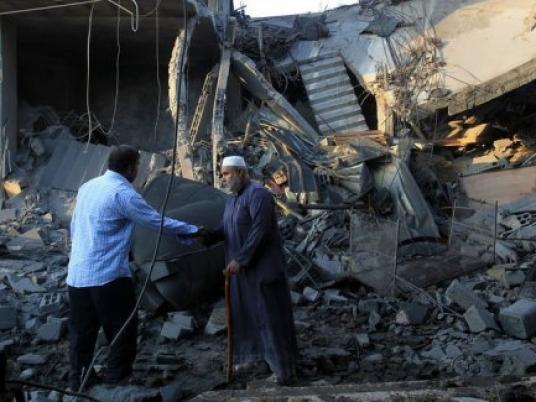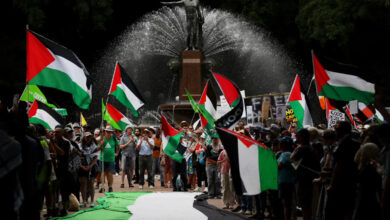
When Israel named its recent military operation on the Gaza Strip “Pillar of the Cloud,” many drew a biblical connection to Exodus, when Moses and his Jewish followers crossed safely to the land of Canaan while the pharaoh and his army drowned.
Not only was the attack directed at the Islamist government of Gaza, but many perceived it as directed at Egypt’s emerging Islamist authority and its Muslim Brotherhood president, Mohamed Morsy.
Indeed Egypt was immediately put under the spotlight as the only viable broker of a ceasefire, with international diplomacy outsourcing the job to the country’s new elite, still in the process of configuring a coherent policy regarding the Israeli-Palestinian conflict.
Morsy is the solution
Responding to a simple question on who can stop the bloodshed that has claimed more than 100 lives in Gaza, as of press time, a former American diplomat responded unhesitatingly, “Mohamed Morsy.”
“Our position continues to be that those nations in the region, particularly nations that have influence over Hamas — and that’s principally Egypt and Turkey, also Qatar … — that those nations need to use that influence to de-escalate the conflict,” White House Deputy National Security Adviser Ben Rhodes said Monday. President Barack Obama stressed the need for an end to Hamas rocket attacks on Israel in a telephone call to Morsy Monday to discuss ways to de-escalate cross-border fighting in Gaza, the White House said.
From the onset and nominally, Egypt chose hardline rhetoric against Israel, very different to that used under ousted President Hosni Mubarak, highly perceived as someone who bended to both Israel and the US.
Morsy sent Prime Minister Hesham Qandil to Gaza Friday in what was the first visit by an Egyptian official there since Hamas took over the territory in 2007. Morsy also gave a 20-minute-long televised speech in which he described Israel’s acts as “unacceptable.”
“I say to those on behalf of all the Egyptian people that Egypt today is different from yesterday, and Arabs today are different from yesterday. I say confidently that Egypt will not leave Gaza alone … We assure [Israel] that the price will be high for continued aggression,” he said.
One of his advisers, who preferred to remain anonymous, stressed that Egypt after the revolution would not leave the Palestinian people behind.
“This is no longer the Egypt you used to know before. We are accountable to the people who elected us,” he says.
Meanwhile, Khaled Meshaal, head of Hamas’ political bureau, also commended Egypt for the role it is playing, asserting that it is a different country now that it is throwing its support behind his government against the Israelis. He spoke at a press conference in Cairo Monday.
Pundits see the rapprochement as only expected, given the organic ties between the Brotherhood and Hamas.
“Egypt has a lot of influence now on Hamas, due to historical, ideological and even personal ties between the new president and Hamas, as opposed to the mistrust and backstabbing that dominated relations between Mubarak and Hamas,” Omar Ashour, director of the Middle East Graduate Studies Program at the University of Exeter Institute of Arab and Islamic Studies, tells Egypt Independent.
During Mubarak’s reign, the regime “empowered Israel” during negotiations and weakened Hamas’ stance, Ashour says.
“Now, under Morsy, it’s the other way around,” he explains.
Many in Egypt and Palestine bitterly recall how the Israeli Operation Cast Lead on Gaza in 2008–2009, which claimed more than 1,400 Palestinian lives, was launched while former Israeli Foreign Minister Tzipi Livno was in Egypt — with complete support from Mubarak, Ashour points out.
A calculated position
In the wake of possible weakened Iranian influence over the Israeli-Palestinian conflict, Morsy is perceived as the only one who can step up and fill the gap.
Ashour thinks that if Egypt succeeds in brokering a truce, it will strengthen its position in the region as Morsy proves to the world after only a few months of taking power that he is capable of leading the peace process.
The alienation of Hamas by the former Egyptian regime had made it turn to Iran, the empire much dreaded by the West and Israel. However, the Shia-dominated Iran lacks the ideological and historical ties that bring the Sunni Muslim Brotherhood closer to Hamas.
“Iran mostly supported Hamas through funding against their common enemy Israel, while the Brotherhood’s ties with Hamas are much stronger and deeper,” says Emad Gad, an international relations expert at Al-Ahram Center for Political and Strategic Studies.
Gad argues that Hamas was further distanced by Iran following its strong support for the Syrian regime, which has been repressing a months-long rebellion against the rule of President Bashar al-Assad.
Renowned journalist Abdallah al-Senawy says Hamas has been primarily depending on Egypt to sort out a solution for the current impasse.
“Egypt was the main country that Hamas depended on in the negotiations to broker the truce,” he says, adding that Qatar’s role remains unclear.
Qatar’s Hamad bin Isa al-Khalifa paid a historic visit to Gaza before the Israeli attacks started in October. The visit was dubbed by many, including Umma University in Gaza political science professor Adnan Abu Amer, as “an attempt to seize the opportunity of a power gap left in Gaza following the Arab revolutions and regional changes. Qatar has its political interests in the region.”
But this interest was not played out by the small kingdom, which has strong affiliations with the West in the current conflict.
As of press time, news of the truce remained unclear. But Palestinian sources had mentioned that the deal would include a halt on Israeli assassinations of Hamas leaders alongside Hamas’ halt on rockets fired from Gaza into Israel.
Besides opening its operation with the killing of the senior Hamas military commander Ahmed al-Jabari, Israel has struck more than 1,350 targets in Gaza, according to AFP. Meanwhile, 640 rockets have hit southern Israel, while another 324 have been intercepted, as of Tuesday.
While this Islamist-flavored brokerage is not necessarily friendly to Israel, it is committed to the peaceful relations that reigned between the two countries since the 1970s, suggesting no radical change in the core of the relationship.
In an interview with Egypt Independent, the presidential adviser confirms that the country is committed to the peaceful nature of its revolution.
“Most of the Arab Spring states were peaceful, and we are trying to maintain this peaceful attitude. As a strategic option, we would like to participate in making peace and taking whatever steps we can to achieve that,” the adviser says.
And while talk about amending the peace accords between Egypt and Israel was looming, there has been no indication of commitment to any change.
“The truce won’t affect Camp David in any way,” Senawy says, referring to the peace treaty, arguing that Egypt doesn’t have the will to renegotiate the treaty now, when it still has many internal issues to handle.
But many argue the preservation of the status quo regarding the peace deal means the continuation of the weak state presence in Sinai, which Israel has complained about, after several rockets were launched from the peninsula.
Jabari, whose assassination inaugurated operation Pillar of the Cloud, was described by Israeli academic and politician Gershon Baskin as a subcontractor for Israel’s security in the strip and the surrounding areas, policing militant groups such as those infiltrating Sinai.
Egypt’s caution hence will need to hinge on Israel’s appeasement, alongside its rapprochement with Hamas — a balance many deem difficult.
This piece appears in Egypt Independent's weekly print edition.




